History
With an aim to create missionary social worker freedom fighter, Lala Lajpat Rai, founded the organisation in November 1921. It was inaugurated by Mahatma Gandhi, and Lalaji who had donated his bungalow in Lahore to the organisation and his library of over 5000 books, remained its founding President till his death in 1928. Its subsequent Presidents were Purushottam Das Tandon, Balwantrai Mehta, and Lal Bahadur Shastri. [2]
"The Society was initially started with the Tilak School of Politics in 1921, to train those who would work in the political field. The state of the country during 1921 engendered a war atmosphere in which normal priorities had to be waived. The initiates pledged to serve the Society and were bound only by their word and sense of honor and of duty."
The organization's programs today include providing a forum for farmers to sell their produce in cities, providing artisans from rural areas with a place to sell their services and products in cities. The non-profit is also involved in education and family health campaigns.
Lal Bahadur Shastri, second prime minister of India, was a lifelong member of the society [3]

Lal Bahadur Shastri was an Indian statesman who served as the second Prime Minister of India. He promoted the White Revolution – a national campaign to increase the production and supply of milk – by supporting the Amul milk co-operative of Anand, Gujarat and creating the National Dairy Development Board. Underlining the need to boost India's food production, Shastri also promoted the Green Revolution in India in 1965. This led to an increase in food grain production, especially in Punjab, Haryana and Uttar Pradesh.

The All India Trade Union Congress (AITUC) is the oldest trade union federation in India. It is associated with the Communist Party of India. According to provisional statistics from the Ministry of Labour, AITUC had a membership of 14.2 million in 2013. It was founded on 31 October 1920 with Lala Lajpat Rai as its first president.
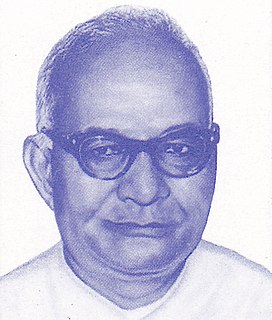
Balwantrai Mehta was an Indian politician who served as the second Chief Minister of Gujarat state, India. He participated in Indian independence movement and later held various public offices. He is considered as the 'Architect of Panchayati Raj ' due to his contributions towards democratic decentralisation.
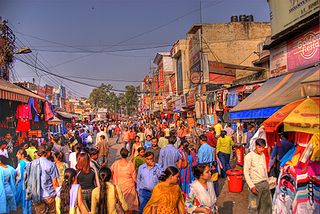
Lajpat Nagar is a residential and commercial neighborhood in the South East Delhi district of Delhi. It was named in honor of Lala Lajpat Rai and is today most known for the Lajpat Nagar Central Market. This area is not to be confused with the Lajpat Nagar in Ghaziabad in the NCR region.

Lala Lajpat Rai was an Indian author, freedom fighter, and politician. He played a pivotal role in the Indian Independence movement. He was popularly known as Punjab Kesari. He was one of the three members of the Lal Bal Pal triumvirate. He was also associated with activities of Punjab National Bank and Lakshmi Insurance Company in their early stages in 1894. He died a few weeks after sustaining severe injuries during a baton charge by police when he led a peaceful protest march against the all-British Simon Commission, a commission constituted by the United Kingdom for Indian constitutional reform.

Purushottam Das Tandon was a freedom fighter from Allahabad, Uttar Pradesh, India. He is widely remembered for his opposition to the partition of India, as well as efforts in achieving the Official Language of India status for Hindi. He was customarily given the title Rajarshi. He was popularly known as UP Gandhi. He was awarded the Bharat Ratna, India's highest civilian award, in 1961.
Hindustan Socialist Republican Association (HSRA), previously known as the Hindustan Republican Army and Hindustan Republican Association (HRA), was an Indian revolutionary organisation founded by Ram Prasad Bismil, Ashfaqulla Khan, Sachindra Nath Bakshi, Sachindranath Sanyal and Jogesh Chandra Chatterjee. HRA's written constitution and published manifesto, titled The Revolutionary, were produced as evidence in the Kakori conspiracy case of 1924.

Bhai Parmanand was an Indian nationalist and a prominent leader of the Hindu Mahasabha.

Lal Bal Pal were a triumvirate of assertive nationalists in British India in the early 20th century, from 1906 to 1918. They advocated the Swadeshi movement involving the boycott of all imported items and the use of Indian-made goods in 1907 during the anti-Partition agitation in Bengal which began in 1905. Lala Lajpat Rai had a famous dialogue during Swadeshi movement,
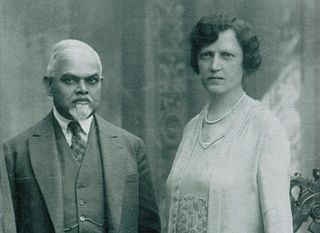
Sardarsinhji Ravaji Rana (1870–1957), often abbreviated S. R. Rana, was an Indian political activist, founding member of the Paris Indian Society and the vice-president of the Indian Home Rule Society.
Sir Shri Ram was an Indian industrialist and philanthropist. He was the son of Rai Bahadur Ram Kishen Das Gurwale, the founder of the Delhi Cloth & General Mills, which remains one of the oldest firms in India today.
Dhudike is a village in Moga-I Tehsil in Moga district of Punjab state, India. It is located 17 km east from District Moga. Freedom fighters like Baba Ishar Singh, Baba Pala Singh Jathedar, Baba Pakhar Singh are a few of the Gadaree from Dhudike who participated in the Gadar Movement during the struggle for independence. Dhudike was the birthplace of the famous Lala Lajpat Rai. Furthermore, during the infamous Emergency days of the 70s, underground activity supporting the ideals of the Naxalite communist movement were prevalent in this area. Such topics are touched upon by renowned Punjabi writer Jaswant Singh Kanwal, who is also from Dhudike.

Lala Hansraj also known as Mahatama Hansraj, was an Indian educationist and a follower of Arya Samaj movement founder, Swami Dayanand. He founded, with Gurudatta Vidhyarthi, the Dayanand Anglo-Vedic Schools System (D.A.V.) in Lahore on 1 June 1886, where the first D.A.V. school was set up in memory of Dayanand who had died three years earlier.
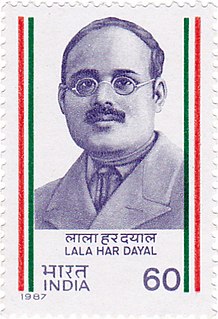
Lala Har Dayal Mathur was an Indian nationalist revolutionary and freedom fighter. He was a polymath who turned down a career in the Indian Civil Service. His simple living and intellectual acumen inspired many expatriate Indians living in Canada and the U.S. in their campaign against British rule in India during the First World War.

Bhagwati Charan Vohra was an Indian revolutionary, associated with Hindustan Socialist Republican Association. He was an ideologue, organiser, orator and a campaigner.

Amarnath Vidyalankar was an Indian member of Parliament, social worker and journalist. He was involved in the Indian independence movement and a member of the Indian National Congress since before independence. After independence, Vidyalankar was Minister of Education, Labor and Languages in the Government of Punjab from 1957 to 1962 and a member of the First (1952–56), Third (1962-67) and Fifth (1971-1977) Lok Sabhas.
Ranbir was a daily Urdu language newspaper published from Jammu, India. It was the first daily newspaper in Jammu and Kashmir.

Lala Achint Ram was an Indian freedom fighter, Gandhian and a member of the Indian National Congress party.
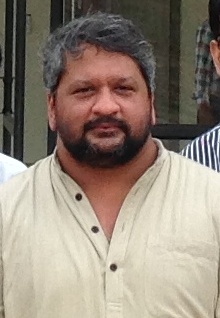
Adarsh Shastri is an Indian politician represents Dwarka.
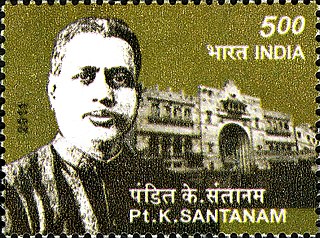
Pandit K. Santanam born in an Iyengar family in Kumbakonam, Madras Presidency was a barrister, politician, businessman and a freedom fighter. He was a close associate of Lala Lajpat Rai and co-founded the Lakshmi Insurance Company which later found its way into the Life Insurance Corporation. He played a key role in the telling the story of Jallianwala Bagh massacre to the nation—something that the government-appointed Hunter Commission had buried.














